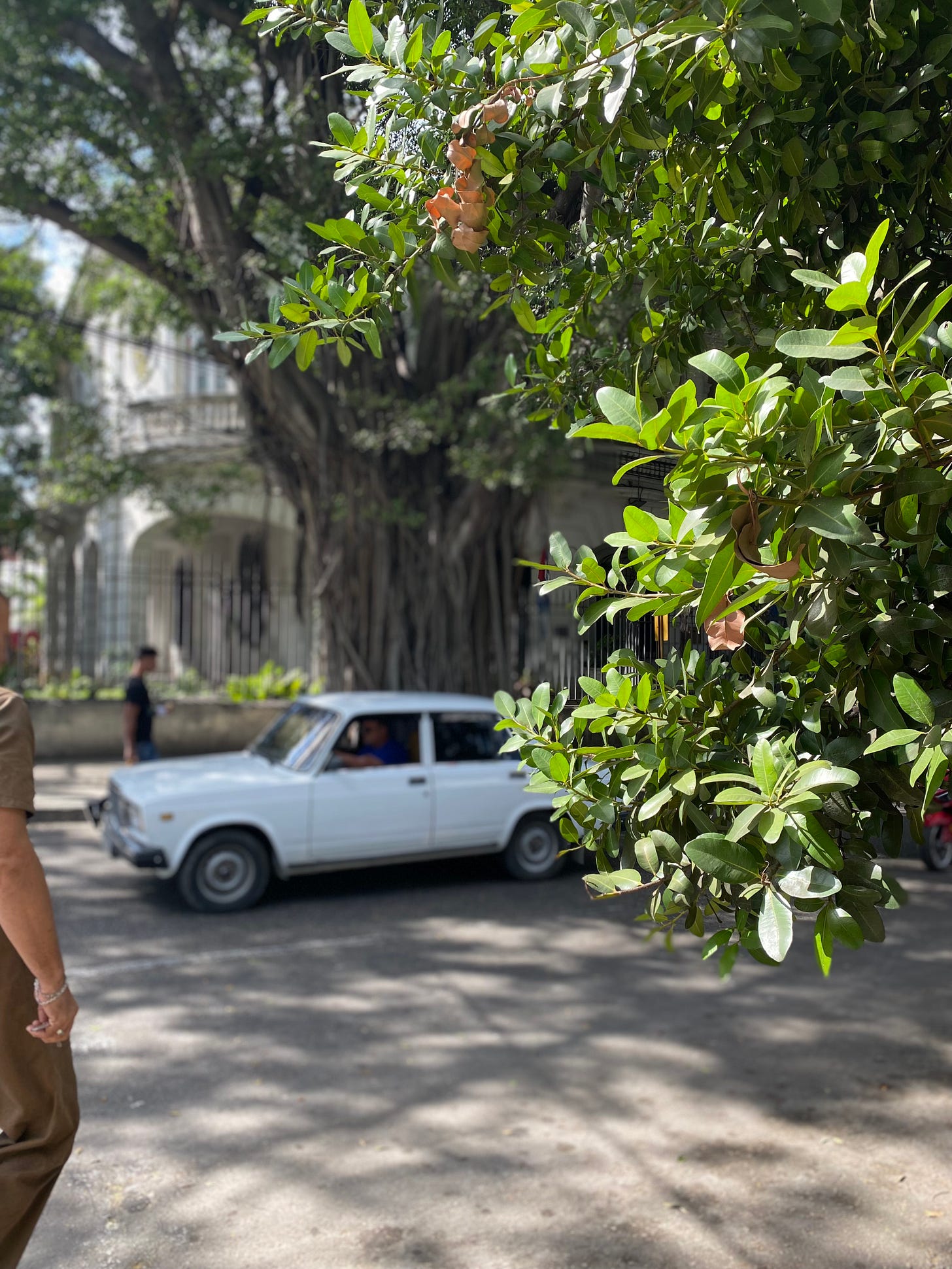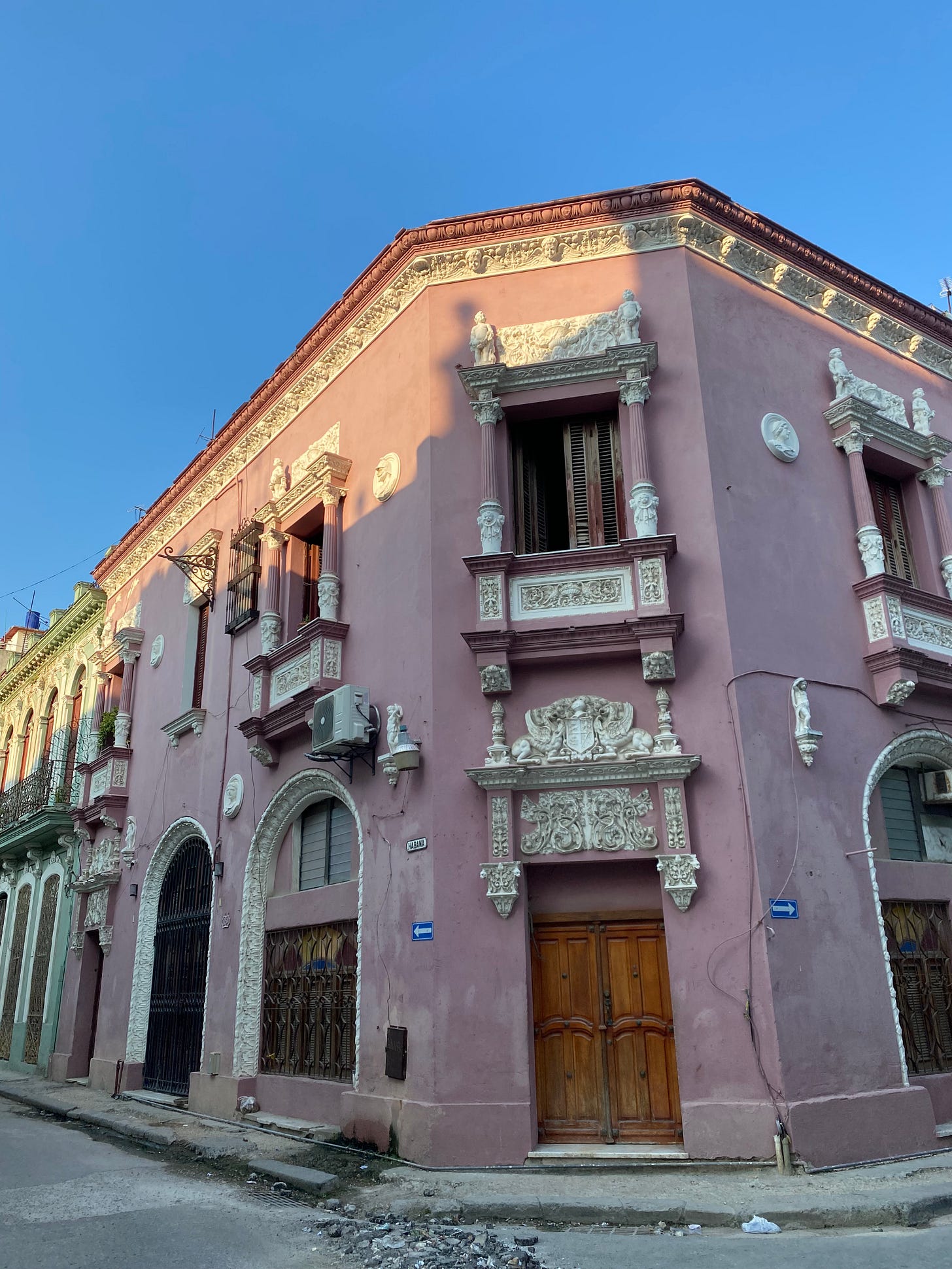January 6, 2023
Happy Friday, travelers!
I don’t typically place much stock in the turning of years. A New Year is a birthday to me, not so much a time to make a long to-do list or a plethora of goals. After all, our bodies are in a sense of dormancy, tied to a winter season that is still in full swing.1
And I don’t need a date to make goals; I do that all the time, anyway. In fact, I would benefit from less of them.
All of that said, I have found that my anticipation for 2023 has been more optimistic than ever before. I feel hopeful, grateful, eager for what’s to come. I’m starting the year off with a social media vacation. No scrolling; no posting! In the peace and quiet, maybe the muse will visit.
I look forward to a break from all the noise, which is one of many gifts Cuba gave me.
Somber and silent in contemplation, we headed to the airport that Saturday. It had been the shortest week of my life, in more ways than one. A tangle of thoughts and feelings resided in my mind and body about what I’d just witnessed in a country unlike any other I’d before seen.
I looked at Destiney, and said something that had been on my mind all morning.
“Sometimes, I wonder what would have happened if Marita had killed Fidel.”
Early last year, long before I knew Cuba would be the last country of 2022, I read a fascinating, if strange, memoir. People claim Marita Lorenz is an unreliable narrator with conflicting stories.
But if what she says is true, then she had many powerful people to call enemies. At the end of it all, I don’t know the truth. But I do know that, at minimum, her story makes you think.
Here is the CliffsNotes version (or SarahNotes, since this is based on my memory):
Marita Lorenz was born in Germany in the late 30s, and she survived a concentration camp as a child. After the war, she went back to Berlin with her family, where they housed American soldiers.
Her father was a cargo ship captain, so she crossed the Atlantic on a voyage with him as a young woman. In that time, every ship was required to stop in Havana when arriving to the Western Hemisphere.
Marita and Fidel (supposedly) fell in love at first sight. Before he was a revolutionary, apparently the guy was a heartthrob. Over the years, Marita went back and forth to Cuba.
As Fidel rose to power, the CIA sent Marita back to Cuba for a “visit” with poison to kill Fidel. She said she planned to do it, but when the time came, she just couldn’t.
After everything they’d been through, she still loved him.
Now, I imagine how different the world would have been if she’d slipped that vial in his drink. It would have literally altered history for a significant chunk of the 20th and 21st centuries.
The night before we left, we strolled around Old Havana with two new friends we’d made. Everyone we met was very…open to discussion on more taboo topics.
Over Cuba Libres in a cobblestone plaza beneath the imposing structure of a church, we talked history.
One of them told me there were times that Fidel would visit an area of the city, run down and in need of repair for residents. The people would rush to clean the streets, repair thresholds, make everything bright and shiny and beautiful. Fidel had to see the best, and nothing less.
While he didn’t clarify if this was a top-down order to the people, it still bade me pause. I nodded my head to show I saw what he meant.
And I thought about how, regardless of the place, at our very core, we often become what we claimed to fight against. (I say this because the revolution was fighting against a dictator at first, Fulgencio Batista, who was completely out of touch with the Cuban people’s real lives. You can learn about him from my favorite podcast.)
Power does something to us as humans. It reveals the worst in us, I think.
To rise above that would require a daily struggle with self, one that most people who desire power are unlikely to do. Unlikely to perceive, or care even if they know deep down it is there. Like the rumbling omen deep beneath the surface of the sea before tsunami waves crash onto dry land, destroying everything in sight. It grows somewhere deep, and when it destroys, it starts with us before seeping out to harm others. Like a poison, it permeates. Clings.
And it takes seemingly forever to recover. If there is full recovery at all.
What’s On My Tray Table
Currently, I’m about halfway through The Night Watchman. I’ll share a review once I’ve finished it! So far, it is amazing.
Each month, I plan to send a list of book recs that fit the following month’s theme for the reading challenge. Here is my list for January while it’s still early in the month.
The theme is to re-read a novel you were assigned in school. I realize many of us will have different answers to this, but if you want to use one of mine, here they are!
The Diary of a Young Girl, by Anne Frank (This is a memoir, not a novel. But it counts because it’s that important.)
Number the Stars, by Lois Lowry
The Boy in the Striped Pajamas, by John Boyne
To Kill a Mockingbird, by Harper Lee
Brave New World, by Aldous Huxley (I think I’ll read this one!)
The Poisonwood Bible, by Barbara Kingsolver (Ooh, and this one!)
The Curious Incident of the Dog in the Night-Time, by Mark Haddon
In Cold Blood, by Truman Capote (This is novelistic journalism, the first of its kind.)
Things Fall Apart, by Chinua Achebe (Definitely re-reading this one in 2023. It should be required reading.)
Be brave and stay that way,
Sarah
Unless you’re in Nashville, where it’s been in the 60s.









Thank you for the window into Cuba. 👍
Your photos of Havana are gorgeous!
I really want to read Things Fall Apart. Even though it’s older, it popped up on several peoples’ best-2022-reads lists.